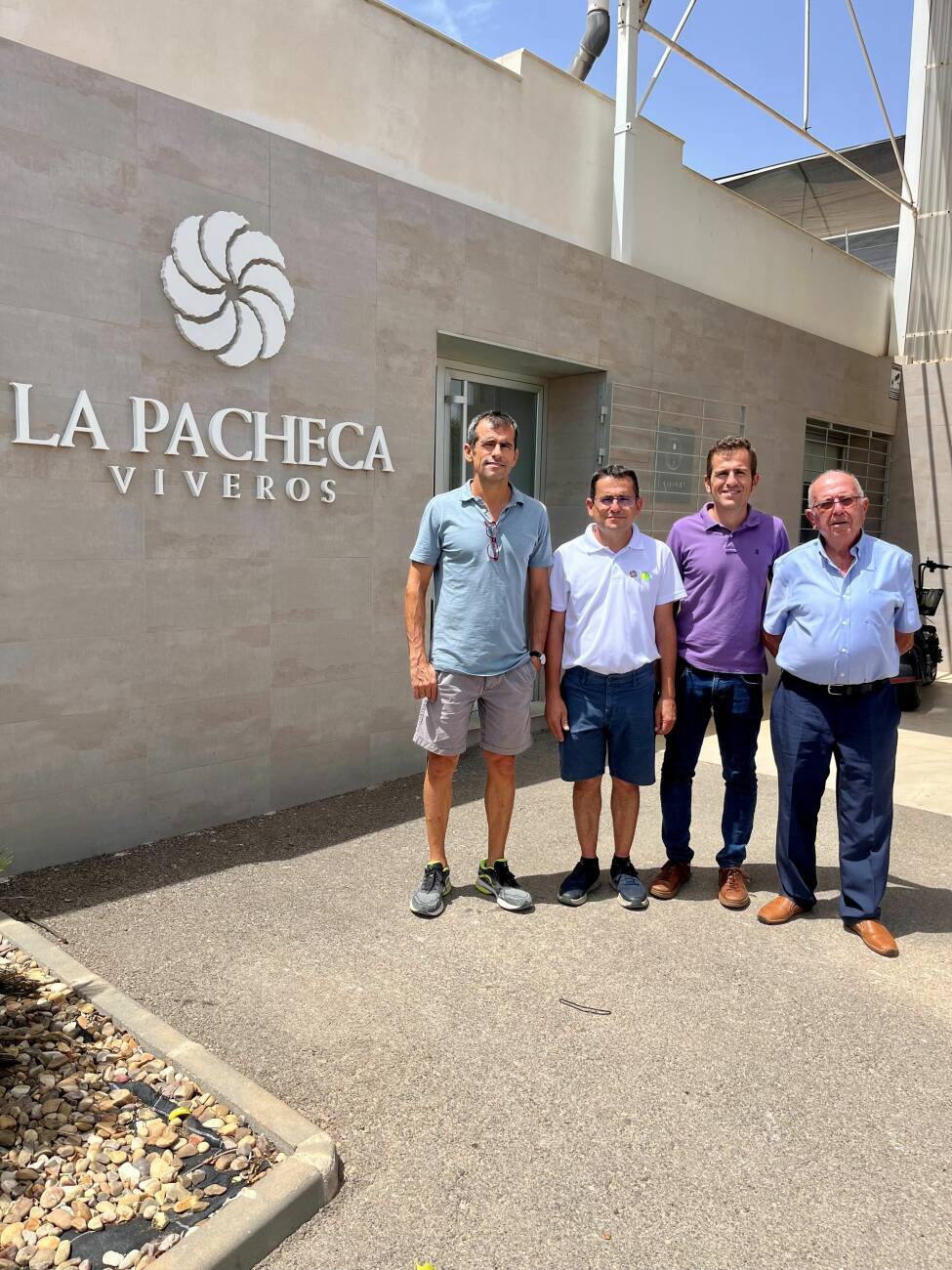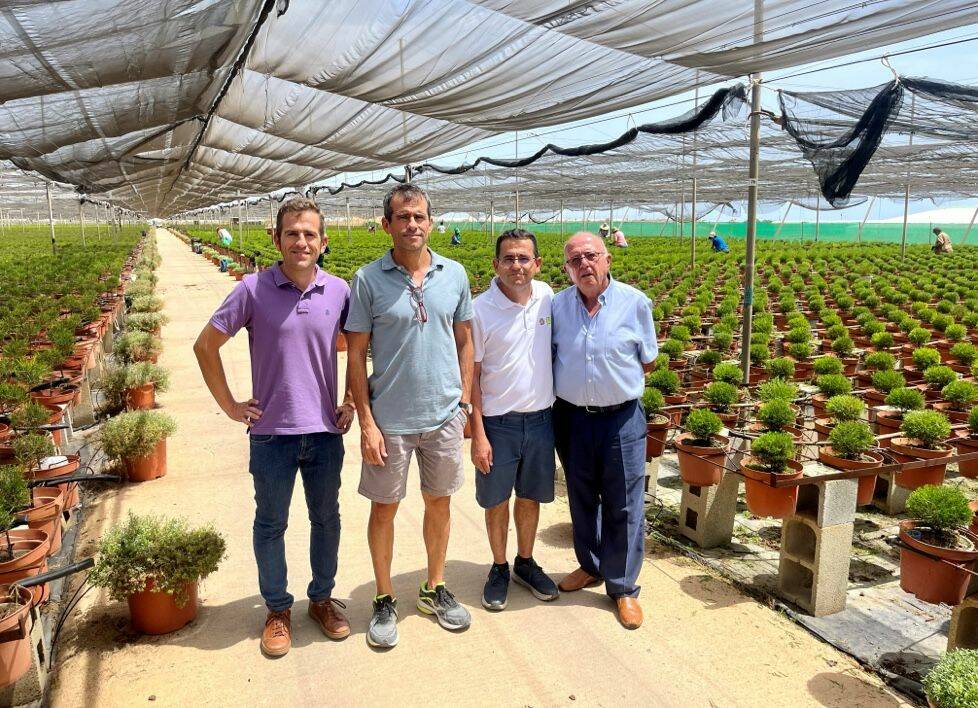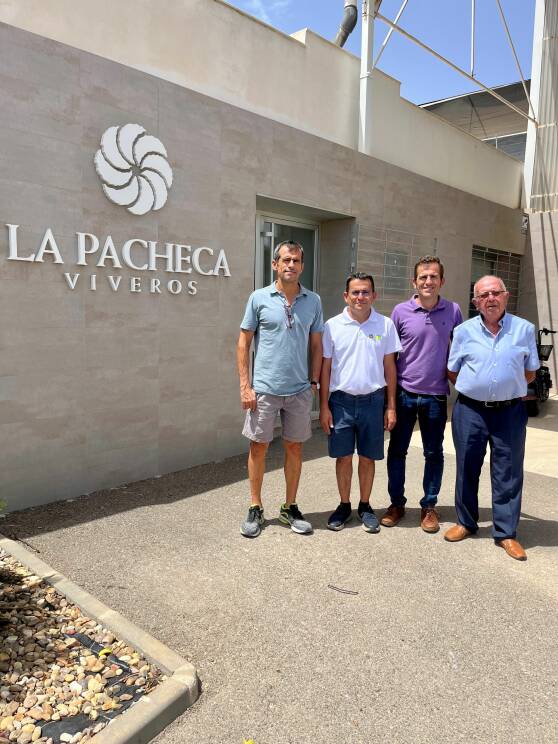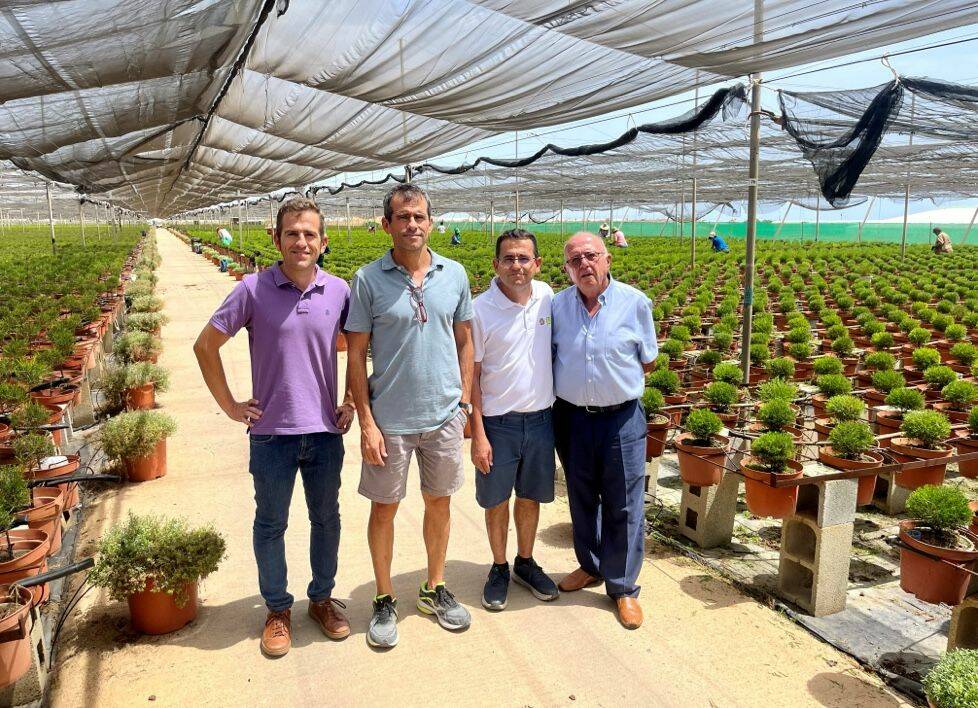Tomorrow's nursery starts here! Stay ahead of the curve and receive the latest news on horticultural innovations in your mailbox.
Newsletter

subscribe


Go to previous article

Go to next article

Back to world map
SCROLL DOWN
Another sustainable choice the brothers have made is to store energy. "The energy we produce in excess is used to heat the greenhouses. So in the winter we use the energy that was generated and stored in excess during the summer. This creates a consistent temperature in the greenhouses throughout the year, which is important for plant growth."

The long droughts have done more than contribute to a network of growers in Murcia: "With temperatures so high, saving water can be hard. It is therefore necessary to use the water as efficiently as possible. This is why we use systems that capture and store rainwater. This rainwater is distributed to the nurseries at a later time, measuring exactly how much water each plant needs. This prevents over-watering the plants, which saves us about 20% of water consumption".
Murcia is undergoing a lot of climate adjustments. Viveros La Pacheca shows us that it’s possible to change the way of working with new, region-specific innovations that contribute to an overall sustainable future.
The brothers inspire other growers in this region with this method. "We have a lot of contact with other companies, and they all run into the same problems and challenges. Murcia is incredibly dry and sometimes it’s difficult to adapt. We discuss and share information. Luckily, there are a lot of growers in Murcia, and a long history of plant production,” Ángel explains.
The increasing drought caused by climate change poses a huge challenge within the ornamental horticulture industry. This is also known by the three Hermanos Daniel, Ángel and Víctor Martínez, who run the company Viveros La Pacheca in Murcia, southeast Spain. Many companies in this specific region are engaged in pursuing growing innovation, because this area is one of Spain’s agricultural capitals. In the past 30 years, however, the region has faced extreme weather conditions such as drought and heat, and is today one of the warmest zones in the country.
Sergio, Senior Technical Manager for ornamental agriculture in Spain, gives us an inside look at his family’s business: "One of the innovations that we specialize in is the production of our own substrates for plants. The substrate is the bed on which organisms such as plants, fungi, or bacteria live. This can mean rocks, soil, and even other organisms like lichen or coral. The substrate is an important part of an organism's habitat, and influences its ability to grow. We take a highly-customized approach to this: we don’t develop one or two general formulas, or combine existing substrates; instead, we create a customized substrate for each plant that fits that specific species exactly." This has placed the brothers at the forefront of the horticulture market, doing something that no one else in Spain has ever attempted. "Creating customized substrates brings several advantages. For example, the quality of the plants goes up tremendously and this method ends up reducing costs. In the beginning, of course, it costs more money to put together an individual approach for each plant species," Sergio says, "but in the long run it produces astounding results.”
The energy we produce in excess is used to heat the greenhouses.
In the past 30 years, however, the region has faced extreme weather conditions such as drought and heat, and is today one of the warmest zones in the country.
Rising temperatures and increasingly prolonged dry spells are having major consequences worldwide. Precipitation patterns are changing and freshwater resources are decreasing. The drought is causing a change in the composition of biodiversity and drastic measures are needed to manage the record-breaking conditions. This is true in ornamental horticulture too, forcing growers to consider what the future of the sector should look like. To counteract the negative effects of an increasingly dry climate, thought must be given to the promotion of sustainable practices, developing efficient irrigation systems and investing in research on drought-resistant plant species.
The Three Hermanos

spain


previous

next

subscribe to our newsletter

Another sustainable choice the brothers have made is to store energy. "The energy we produce in excess is used to heat the greenhouses. So in the winter we use the energy that was generated and stored in excess during the summer. This creates a consistent temperature in the greenhouses throughout the year, which is important for plant growth."
Murcia is undergoing a lot of climate adjustments. Viveros La Pacheca shows us that it’s possible to change the way of working with new, region-specific innovations that contribute to an overall sustainable future.
The energy we produce in excess is used to heat the greenhouses.
The long droughts have done more than contribute to a network of growers in Murcia: "With temperatures so high, saving water can be hard. It is therefore necessary to use the water as efficiently as possible. This is why we use systems that capture and store rainwater. This rainwater is distributed to the nurseries at a later time, measuring exactly how much water each plant needs. This prevents over-watering the plants, which saves us about 20% of water consumption".
The brothers inspire other growers in this region with this method. "We have a lot of contact with other companies, and they all run into the same problems and challenges. Murcia is incredibly dry and sometimes it’s difficult to adapt. We discuss and share information. Luckily, there are a lot of growers in Murcia, and a long history of plant production,” Ángel explains.

The increasing drought caused by climate change poses a huge challenge within the ornamental horticulture industry. This is also known by the three Hermanos Daniel, Ángel and Víctor Martínez, who run the company Viveros La Pacheca in Murcia, southeast Spain. Many companies in this specific region are engaged in pursuing growing innovation, because this area is one of Spain’s agricultural capitals. In the past 30 years, however, the region has faced extreme weather conditions such as drought and heat, and is today one of the warmest zones in the country.
Sergio, Senior Technical Manager for ornamental agriculture in Spain, gives us an inside look at his family’s business: "One of the innovations that we specialize in is the production of our own substrates for plants. The substrate is the bed on which organisms such as plants, fungi, or bacteria live. This can mean rocks, soil, and even other organisms like lichen or coral. The substrate is an important part of an organism's habitat, and influences its ability to grow. We take a highly-customized approach to this: we don’t develop one or two general formulas, or combine existing substrates; instead, we create a customized substrate for each plant that fits that specific species exactly." This has placed the brothers at the forefront of the horticulture market, doing something that no one else in Spain has ever attempted. "Creating customized substrates brings several advantages. For example, the quality of the plants goes up tremendously and this method ends up reducing costs. In the beginning, of course, it costs more money to put together an individual approach for each plant species," Sergio says, "but in the long run it produces astounding results.”
In the past 30 years, however, the region has faced extreme weather conditions such as drought and heat, and is today one of the warmest zones in the country.


Back to world map
Rising temperatures and increasingly prolonged dry spells are having major consequences worldwide. Precipitation patterns are changing and freshwater resources are decreasing. The drought is causing a change in the composition of biodiversity and drastic measures are needed to manage the record-breaking conditions. This is true in ornamental horticulture too, forcing growers to consider what the future of the sector should look like. To counteract the negative effects of an increasingly dry climate, thought must be given to the promotion of sustainable practices, developing efficient irrigation systems and investing in research on drought-resistant plant species.
The Three Hermanos
spain